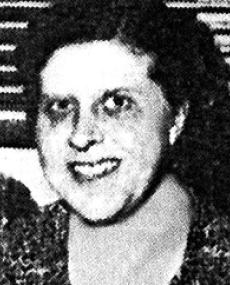
Trade union leader and organizer Johanna Hendrina (Joey) Scheepers was one of the four daughters of Sarel Gerhardus Breitenbach and his wife, Johanna Hendrina Strydom.
Johanna Scheepers was born in 1915. During the depression of the 1930s Scheepers and her sister, Anna Magrieta, went to Johannesburg to seek employment. As was the case with many Afrikaans women, she found a position in a clothing factory and later worked at the Bell Clothing factory. Scheepers became involved in the activities of the Garment Workers′Union (GWU) in 1933. During a strike for better working conditions, Scheepers led a march of the employees of the Bell Clothing factory to the Trade Hall in Johannesburg where the GWU had its offices. The leadership qualities she showed led to her election as shop steward. She and other shop stewards subsequently recruited new members for the union. Her warm personality made her successful in this task.
In 1933 Scheepers was elected as Secretary of the Fordsburg/West Rand No. 1 branch of the GWU. Early in 1934 this led to her election to the central executive committee of the GWU. She also represented the GWU at conferences of the South African Trades and Labour Council and at the meetings of its local committee in Johannesburg. In 1943 she was elected as Secretary and Organizer of the central branch of the GWU of South Africa. Scheepers actively supported the policy of the GWU to support workers in other trades who went on strike to improve their low wages. With other prominent leaders, such as Dulcie Hartwell and Johanna Cornelius, she organized other workers into trade union structures. In 1943 the National Union of Distributive Workers began a strike to gain recognition for the union and secure better wages and working conditions. In support of the strike, Scheepers, Hartwell and Cornelius were among the trade unionists who chained themselves to the railings outside the central OK Bazaars. In 1948 Scheepers was appointed GWU organizer at its head office. Thus she was involved in the new negotiations between the GWU and the employers, as the previous agreement was due to end on 31 August 1948. When the employers refused to renew the agreement, the GWU decided on arbitration, with Scheepers as one of the chief witnesses for the union in court. This led to a better settlement for the union.
From 1935 to 1948 the GWU, a militant and multiracial trade union, was fiercely opposed by white unions and Afrikaner Nationalist movements, who branded E.S. Sachs, General Secretary of the GWU, a communist. The opposition reached a climax on 16 September 1948 when members of the Blanke Werkers Beskermingsbond (White Workers′ Protection League) disrupted a meeting of the GWU′s No.1 branch in Johannesburg and violence erupted. Labour Minister B.J. Schoeman ordered a commission of inquiry into, inter alia, the affairs and administration of the GWU. Scheepers was one of the witnesses for the union before the commission. In April 1951 she was chief witness for Sachs when he sued Die Werkerspers Maatskappy (the Workers′ Press Publishing Company) for defamation.
In February 1952 Scheepers (as organizer of the GWU), Johanna Cornelius, R. de Freitas and Sachs organized a strike of 2 000 garment workers who opposed the decision of Port Elizabeth employers to put a ceiling on wages and cost of living allowances.
Scheepers′ last prominent action in the trade union was in 1952 when she was in the forefront during demonstrations against the banning and arrest of Sachs. She tried to prevent Sachs′ arrest at a mass meeting at the steps of the Johannesburg City Hall on 24 May 1952 by holding onto him when the police were taking him away. She was also one of the four leaders to be charged with infringement of municipal regulations by holding a meeting without written permission on the steps of the City Hall on 26 May 1952. The case against them was dropped but the Johannesburg municipality subsequently refused to allow any protest meetings. She joined other female demonstrators who stood in line on the City Hall steps with mouths gagged, protesting against this restriction. Scheepers was one of the GWU members who chained themselves to railings in front of shops in Johannesburg, carrying placards demanding Sachs′release.
Scheepers was an ardent supporter of the GWU. Her good relations made her a well-liked and successful organizer. Scheepers married Lourens Christian Marthinus (Steve) Scheepers, a prominent trade union leader, on 24 September 1949. Scheepers also was stepmother to Steve′s son from his previous marriage. She died in 1976.